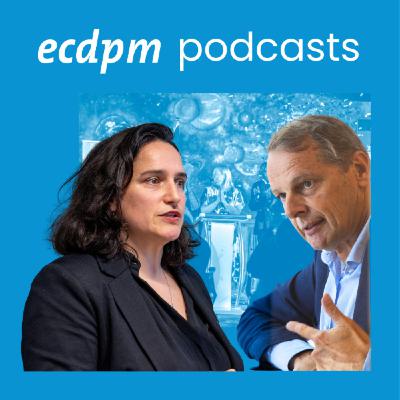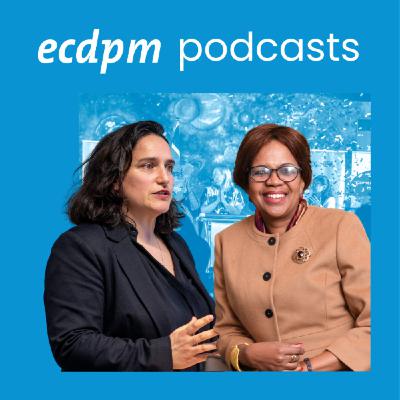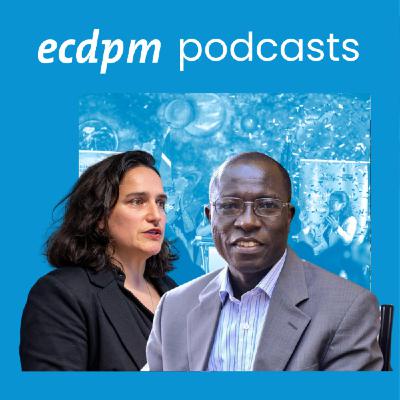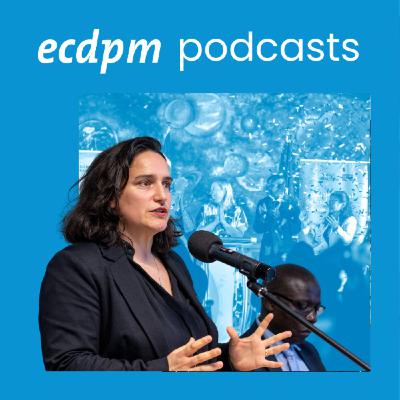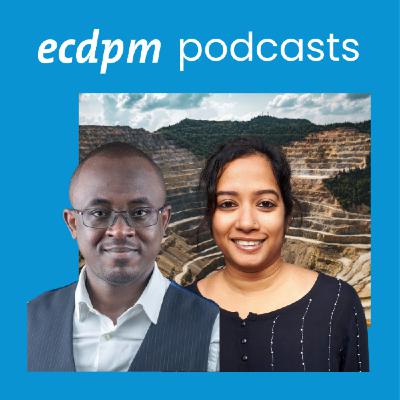Discover Europolis: The Global Europe Podcast by ECDPM
Europolis: The Global Europe Podcast by ECDPM

Europolis: The Global Europe Podcast by ECDPM
Author: ECDPM
Subscribed: 31Played: 150Subscribe
Share
© All rights reserved
Description
Faced with geopolitical and economic turbulence, Europe needs new and better partners to secure its prosperity. This podcast looks at how new dynamics are reshaping relations between the EU and the wider world and how Europe might navigate this new terrain.
Join us as we break down EU policy through insightful conversations with leading policymakers, industry leaders and experts. Discover how the EU could drive innovation, competitiveness, and progress in the global arena, and understand how policymakers are thinking about shaping our sovereign future.
Hosted on Acast. See acast.com/privacy for more information.
73 Episodes
Reverse
In this episode of Europolis, Chloe Teevan and Gautam Kamat are joined by Hiroki Habuka, one of Japan's leading AI policy experts, to discuss Japan’s unique, agile approach to AI regulation and how it offers a modular alternative to the EU’s prescriptive model. Hosted on Acast. See acast.com/privacy for more information.
In this episode of Europolis, digital rights advocate and social entrepreneur Gbenga Sesan joins ECDPM's Sabine Muscat to explore the intersection of digital sovereignty, innovation, and human dignity. He argues that for Africa to truly thrive, it must transition from relying on aid to attracting investment, and that innovation cannot happen without respecting the rights of citizens. Hosted on Acast. See acast.com/privacy for more information.
ECDPM director San Bilal speaks to Simon O'Connell, CEO of SNV, the Dutch development agency, as the organisation celebrates its 60th anniversary. The discussion explores how development actors can navigate a "race to the bottom" in aid financing and how reframing the narrative around solidarity isn't just old-fashioned idealism but a pragmatic necessity for a stable world. Hosted on Acast. See acast.com/privacy for more information.
In this episode of Europolis: the Global Europe podcast, Sophie Desmidt interviews Gustavo de Carvalho, senior researcher at SAIIA, on whether Europe and Africa can move beyond old donor-recipient dynamics to become the "adults in the room": stabilising forces that champion multilateralism as others step back.The conversation dives into how the partnership is shifting from aid to investment, the test for the EU’s Global Gateway, and why a true partnership means discussing global security, not just African conflicts. Hosted on Acast. See acast.com/privacy for more information.
Chloe Teevan talks to Melody Musoni to explore how African innovators, researchers, and policymakers are shaping an AI ecosystem that responds to local realities. It highlights a shift from being consumers of technology to producers of homegrown solutions that are already transforming sectors like agriculture, health, and education.The discussion tackles the two sides of the AI debate in Africa: the pessimists, who worry about risks like data bias and the push from Big Tech for profit , and the optimists, who see a chance to tackle long-standing challenges. A central theme is that African countries are determined not to be left behind in the Fourth Industrial Revolution as they were in the past. Hosted on Acast. See acast.com/privacy for more information.
The EU's green and digital ambitions depend on a stable supply of critical raw materials like lithium, cobalt and graphite. With growing concerns over value chain security and dependence on single countries like China, the EU has launched the Critical Raw Materials Act to build more resilient supply chains. But how can Europe build new partnerships, particularly in Africa, to achieve this?In this episode of Europolis, Chloe Teevan is joined by ECDPM's Poorva Karkare, senior policy analyst and expert on industrialisation and regional integration in Africa. They discuss the complexities of the EU's strategy, the role of partner countries in Africa, the much-discussed Lobito Corridor project, and the unavoidable influence of China. Poorva argues that true strategic autonomy for the EU may require innovative partnerships that leverage, rather than exclude, Chinese capabilities in African countries. Hosted on Acast. See acast.com/privacy for more information.
Chloe Teevan and Gautam Kamath interview Rahul Matthan, one of India's leading technology lawyers, to explore India's innovative approach to tech regulation as a "third way" between the US's hands-off approach and Europe's prescriptive regulation. The episode highlights how this approach can unlock data abundance and address European concerns about sovereignty and competitiveness by influencing soft infrastructure and encouraging innovation within public rails. It also points to the potential for EU-India collaboration in creating interoperable frameworks and aligning objectives for digital ecosystems. Hosted on Acast. See acast.com/privacy for more information.
Chloe Teevan and Gautam Kamath interview Kai Zenner, Head of Office for MEP Axel Voss (European People's Party) and Senior Fellow at the Technical University of Munich. Kai was instrumental in the finalization of the AI Act and is a well-known commentator on European tech policy.A paradigm shift in transatlantic relations is forcing Europe to realize that it's "now or never" for significant changes in digital policy. Concerns about potential foreign control over critical data are pushing EU policymakers to act. Kai Zenner discusses his role in the EuroStack initiative: a grassroots movement uniting diverse individuals who feel Europe has become a "digital colony" dependent in critical areas. He describes the biggest hurdle is a lack of political leadership willing to make the necessary hard, strategic investment choices, rather than fragmented small investments.Gautam Kamath concludes by discussing Europe's strategic interdependencies, noting a divide between those advocating for purely European solutions and those recognizing Europe's need for openness and partnerships. Europe's historical strengths lie in being an open trading bloc and fostering consensus and needs to forge mutual partnerships with countries like Brazil (green technologies), Africa (AI), and India (skills and tech stack): moving beyond the "Brussels effect" and focusing on what Europe can learn from its global partners in a multipolar world. Hosted on Acast. See acast.com/privacy for more information.
Chloe Teevan and Gautam Kamath interview Robin Berjon, French-Australian technologist, Deputy Director of the IPFS Foundation, and a major thinker on technology sovereignty and the tech stack.Robin Berjon explains that power in technology stems from operating infrastructures and that the current governance model for these infrastructural systems is largely autocratic, controlled by monopolies or duopolies. This autocratic power, which sets rules for users, can seep into society, potentially making society itself autocratic. The rules set by these digital monopolies can even become more important to businesses, like publishers, than state laws, leading to a loss of self-governance for collectives.He argues that the problem isn't a lack of innovation; it's the capture of architectural control points (e.g., how revenue flows, system defaults) by a tiny number of actors, leading to high power concentration. Breaking these monopolies requires intervention at the infrastructural level to liberate these control points, not just more innovation. Instead of trying to replicate Silicon Valley's model, which could lead to similar problems with European companies, the solution lies in breaking down digital problems into components and rebuilding them as governance infrastructure. The India Stack is presented as an interesting example of this approach: by allowing users on both sides of two-sided markets like ride-hailing to jointly control the network, it enables innovation and works better for both providers and consumers, unlike systems controlled by singular monopolies like Uber or Amazon. Hosted on Acast. See acast.com/privacy for more information.
Although young people are already the driving force behind Africa’s economic transformations, they find themselves locked out from decision-making. In this podcast, Sara Gianesello speaks to Francesca Midzi from the EU delegation in Zimbabwe about the first-ever Youth Sounding Board, which gives young people the opportunity to shape EU action in their country, and lessons learned for promoting youth engagement elsewhere. Hosted on Acast. See acast.com/privacy for more information.
Switching from an off-budget EDF to a unique EU instrument (NDICI-Global Europe) has some technical implications for the EU and for partner countries, which in turn may bring some political consequences to the relationships between them. The NDICI-Global Europe brings in simplicity, flexibility, agility, and reactivity - all crucial to making the EU a more geopolitical player. To understand how the changes land in reality, ex-EU ambassador to the Republic of Cameroon, Philippe van Damme, describes what limitations and potential of the EU’s new approach have been revealed in practice and how the EU has learned, or not learned, from previous approaches. Hosted on Acast. See acast.com/privacy for more information.
The definition of mutual interests is a good occasion to ask how development objectives are integrated in the Global gateway strategy and the NDICI-Global Europe. Moreover, the programming phase of the NDICI-Global Europe allowed the EU not only to define its cooperation activities, but primarily to set its interests and priorities for each partner country, and then seek where and how these could match with the partner country’s priorities. As Botswana’s ambassador to the Kingdom of Belgium and permanent representative to the EU, H.E. Mmasekgoa Masire-Mwamba reveals how Botswana has negotiated its mutual interests with the EU, how this affects its partnership and the asymmetry of this relationship. Hosted on Acast. See acast.com/privacy for more information.
Broadening the partnerships has been one of the significant shifts of the EU development cooperation’s recent evolution. On paper, the EU aims at engaging in a more meaningful manner with civil society, and at supporting them in a more effective way. But in reality, how has the relationship between the EU and civil society in partner countries changed with the EU’s new approach to development? Moses Isooba is the executive director of the Uganda National NGO Platform (UNNGOP), an organisation uniting national and international NGOs in the country, and stresses the importance of engaging with civil society to enhance the participation, legitimacy and influence of its projects. Hosted on Acast. See acast.com/privacy for more information.
In this podcast series, Amandine Sabourin interviews key partners in EU development policy to understand how the EU’s increasingly transactional approach is experienced by partner countries. From EU ambassador to the Republic of Cameroon Philippe van Damme to ambassador Masire-Mwamba of Botswana to the Kingdom of Belgium and Uganda civil society leader Moses Isooba, the series explores how rulings designed in Brussels are actually playing out on the ground, their effect on the EU’s relationship with its partners, and vital lessons for the EU if it wants to achieve its development ambitions. Hosted on Acast. See acast.com/privacy for more information.
Critical raw materials are vital for the EU's green transition and offer African countries a path to green industrialisation. Both however face policy dilemmas: Africa must efficiently use resources within, and share them between, countries, while the EU seeks to derisk from China and maintain industrial leadership. In this podcast, Poorva and Géraud discuss how these different moving parts fit together. Hosted on Acast. See acast.com/privacy for more information.
In Tanzania, gender equality remain a policy priority, but progress is slow. Enter the award-winning Her Initiative, a game-changer that is helping to close the gender gap. This initiative promotes financial resilience and digital inclusion for girls and young women, empowering them to escape poverty and seize more opportunities. Without such innovative efforts, achieving full gender parity could take decades.In this episode of Minding the gap: Conversations on gender, we listen to real-life stories of girls' empowerment from Tanzania. Joining Hanne Knaepen is Lydia Charles Moyo, founder and executive director of the Her Initiative. Lydia talks about the injustice she faced among her peers in school, which led her to set up an award-winning non-profit organisation that aims to achieve financial independence among girls and women. Hosted on Acast. See acast.com/privacy for more information.
The circular economy movement aims to create a restorative and sustainable economic system, but can it promote social justice as well?Women play pivotal roles in the transition to a circular economy, engaging in a variety of activities that drive sustainable practices and resource efficiency. However, significant challenges remain in ensuring that this transition is just and inclusive from a gender perspective. Despite the potential for a circular economy to provide equitable opportunities, current strategies and policies often overlook critical gender dimensions.In the latest episode of ‘Minding the Gap: Conversations on Gender,’ we delve into the potential for gender justice in transitioning to a circular economy. Joining Nadia Ashraf is Katharina Gihring of the African Circular Economy Network to explore the roles women are already playing in the circular economy and what needs to be done to ensure a fair transition for all genders. Hosted on Acast. See acast.com/privacy for more information.
Women and girls play crucial roles in the prevention and countering of violent extremism.While these distinct roles are increasingly recognized, considerable gaps remain between the enthusiastic commitments set out to empower women and girls, and the inadequate support provided for women, women leaders and women’s groups in this fight. The difficulty of mainstreaming gender for the security community is not shared by many violent extremist groups themselves, who have used gendered strategies to recruit members for decades.For the third episode of ECDPM's podcast series 'Minding the gap: conversations on gender', Sophie Desmidt is joined by Aleksandra Dier, who coordinates the work on gender at the UN Security Council Counter-Terrorism Executive Directorate (CTED), to discuss the latest trends and developments in what is needed to ensure that women and girls’ perspectives and roles are matched with the necessary support. Hosted on Acast. See acast.com/privacy for more information.
Migration is one of the key political issues in Europe today, but little attention is given to the impact that gender has on migration patterns. New research is revealing that gender has an influence on an individual’s decision to move, the way they choose to do it and how their movement is perceived by the old and new communities. Hosted on Acast. See acast.com/privacy for more information.
2024 is a key year of elections. From June 6, around 400 million people will be eligible to choose new representatives in the European Parliament. But with polls predicting gains by right-wing parliamentary groups and with a global backsliding on gender equality, how can the vote of women impact the results of the European elections? What impact can we expect from a more right-leaning European Parliament and European Commission leadership on women’s rights and gender equality? What are some of the risks and opportunities in terms of women's political participation in the next European political cycle? Hosted on Acast. See acast.com/privacy for more information.












